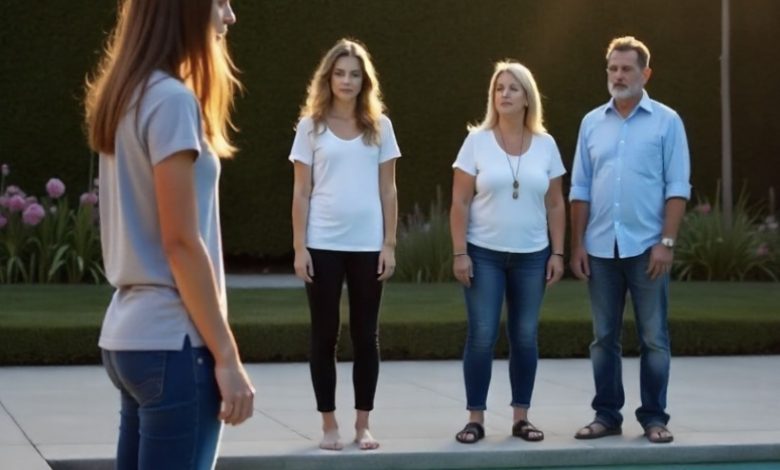Every summer, I let my sister-in-law and her kids enjoy my pool for their parties. Yet the moment I asked to borrow her tent for camping, she scoffed at me.

I always allowed my sister-in-law to use my swimming pool every summer for her kids’ birthdays and weekend parties. It was almost an unspoken agreement. But the one time I asked to borrow her camping tent, she mocked me: “Buy your own stuff—you’re pathetic.” My mother-in-law giggled and added: “You really shouldn’t expect much if you’re always asking for things.” To make matters worse, my husband piled on: “Stop acting like a freeloader, Alisa.”
I left for my trip hurt but trying to let it go. When I came home, my pool was drained, ripped, and completely unusable. On the table, I found a note in Cassidy’s handwriting: “Pool parties are done. Maybe now you’ll learn not to depend on other people.”
I didn’t respond. I didn’t yell, I didn’t cry in front of them. Instead, I stayed silent, and what I did next left the entire family stunned.
The Family Pushover
My name is Alisa, and if you had met me just a few months ago, you’d have called me the pushover of the family. I was the one who always said yes, always made room for others, and never defended myself. I believed keeping the peace was more important than confronting bad behavior. For three months, I played that role. For four years, I gave in to Cassidy’s demands about the pool.
Cassidy is my husband David’s younger sister. She has two children—Daniela and Tyler. The very summer we finished installing our in-ground pool, Cassidy acted as if it belonged to her too. At first, I thought it was fine. After all, family should share. But soon “a few visits” turned into a permanent routine.
Every Saturday and Sunday through the summer, she would turn up with her kids, sometimes dragging along extra friends. There were coolers, floats, and loud music. She didn’t ask if it was okay—she simply told me. The texts always came on Friday night: “Pool party tomorrow at 2. Daniela is bringing a few friends.”
It was as though our backyard had turned into her private club, and I was the staff making it all happen.
The Lack of Boundaries
I tried to hint at boundaries. I’d say things like, “This weekend isn’t great for us,” or, “David and I were hoping to have a quiet Sunday.” But Cassidy would guilt-trip me instantly: “It’s just a pool, Alisa. You’re being selfish. My kids don’t have space to play at our apartment.”
My mother-in-law Patricia always backed her up. During family dinners, Patricia would say, “Alisa, you should feel lucky to have such a beautiful pool. The least you can do is let the grandchildren enjoy it.” She’d say it with a smile, but it was the kind of smile that makes you feel two inches tall.
The truth is, David and I loved using the pool for ourselves. We enjoyed our quiet evening swims, floating side by side under the stars. But to Patricia, my enjoyment didn’t count. Only Cassidy’s happiness mattered.
And David? He shrugged every time I complained. “She’s my sister, Alisa. The kids love it. Mom’s happy. Don’t make this a big deal.”
Meanwhile, Cassidy rearranged our furniture, used our grill without asking, left muddy footprints across the kitchen tiles, and blasted music loud enough to annoy the neighbors.
Still, I stayed quiet.
The Breaking Point
In July, David and I finally had a trip planned—camping in Yellowstone. The only thing missing was a tent large enough for both of us. Then I remembered: Cassidy had bought a fancy four-person tent the year before. She had bragged about how expensive it was on Facebook and used it once.
I thought, “Perfect. She owes us a favor after all the pool access.”
When I called her, her silence told me everything.
“Are you actually asking me to lend you my $400 tent?” she finally said.
“Just for a few days,” I replied. “We’d take good care of it.”
“Absolutely not,” she snapped. “Buy your own things. You’re pathetic. You act like a child who can’t handle her own life.”
I reminded her, “You’ve used our $40,000 pool for four years.”
“That’s different,” she barked. “The pool just sits there. My tent is valuable. I can’t believe you’d even ask.”
And she hung up.
When David got home, instead of supporting me, he frowned. “You embarrassed us. Don’t ask my family for expensive stuff. It makes us look bad.”
I stared at him in disbelief. “Your sister uses our pool every weekend. How is that not expensive?”
“The pool doesn’t count,” he muttered. “Stop being a mooch, Alisa.”
The next day, Patricia called. “Alisa, dear,” she cooed, “you really should stop asking for so much. Beggars can’t be choosers.”
The Yellowstone Trip
By the time we left for Yellowstone, I was carrying so much anger it felt like a stone in my chest. But during those five days in nature, I started to breathe again. The hikes, the quiet nights, the campfire talks—everything felt healing. For once, I wasn’t dealing with Cassidy’s chaos.
But peace ended the moment we came home.
The Pool Disaster
When we pulled into our driveway, I froze. Our pool was empty. Completely drained. The liner was shredded with long, jagged tears. Furniture was thrown around the yard, an umbrella broken in half, and our pool cleaner smashed to pieces.
On the table lay a note weighted down with a rock. I recognized Cassidy’s loopy handwriting.
Alisa,
Pool parties are finished. Maybe now you’ll stop being a leech. If you keep taking from people, eventually you’ll lose something too. Consider this your lesson.
Cassidy
David read over my shoulder, his face pale. “She wouldn’t…” he whispered. But the pool technician proved otherwise.
“This wasn’t an accident,” the man told us. “Someone unplugged the system, drained it, and damaged it deliberately. You’re looking at $15,000 at least.”
Silent Planning
For three days, I said nothing. I ignored calls. I let David’s voicemails to Cassidy go unanswered. He was frantic, while I was cold and calm.
Because here’s the truth: Cassidy underestimated me. She thought I was just a passive sister-in-law. But I’m organized, patient, and I keep records. For years, I had saved her texts, her posts, even photos of her pool “events.” I had receipts from parents paying her on Venmo for “pool party packages.”
She thought she was teaching me a lesson. Instead, she had just written her own downfall.
Turning the Tables
My first move was insurance. I filed a claim, attaching photos of the destruction, the technician’s report, and Cassidy’s handwritten note admitting what she had done.
Next, I gathered proof of her “business.” Yes, she had been charging other parents for pool access—without permits, without insurance, without paying taxes. Screenshots of Facebook posts, pictures of big gatherings, Venmo receipts—it was all there.
I reported her to city code enforcement, the HOA, and even the state tax office. They were eager to hear about unreported income.
Finally, I called David’s Uncle Robert, a retired judge. When he heard the story, he was furious. “She destroyed your property? And Patricia defends her? I’ll make some calls.”
The Fallout
Two weeks later, Cassidy called me in tears. “Alisa! I just got a bill from your insurance company for $28,000! This can’t be real!”
“It’s very real,” I said calmly. “That’s the cost of what you did.”
“But I didn’t mean for it to go this far! I just wanted to prove a point!”
“You did,” I replied. “But not the one you think.”
Patricia called soon after, cold and accusing. “You’re tearing this family apart over money.”
“No,” I corrected her. “Cassidy’s choices tore this family apart. I’m just not covering for her.”
Uncle Robert then called a family meeting. He looked Cassidy in the eye: “You destroyed property. You ran an illegal business. Alisa could press criminal charges. You’re lucky she hasn’t.”
The room was silent.
Standing Strong
I made it clear: “You have 30 days to pay for the damages. And you are no longer welcome in my home. Pool parties are finished—for good.”
The aftermath was brutal. Cassidy was fined by the city. The HOA issued warnings. The state opened a tax audit. She had to take out a loan to cover the insurance claim. She lost her part-time job. Eventually, she moved into a smaller apartment, her reputation in shambles.
Meanwhile, our pool was repaired, sparkling again. For the first time in years, our backyard felt like ours. Quiet, peaceful, and free of uninvited guests.
I still took Daniela and Tyler to the community pool sometimes. It wasn’t their fault their mother was reckless. Even Patricia eventually admitted, “Alisa is kinder to those kids than you are, Cassidy.”
The Lesson
I didn’t ruin Cassidy’s life. She did that herself when she chose spite over respect. I simply stopped shielding her from the results. She wanted to “teach me a lesson” about not relying on others. But the real lesson was mine: I finally realized I was worth standing up for.
And that is a truth I will never forget.










